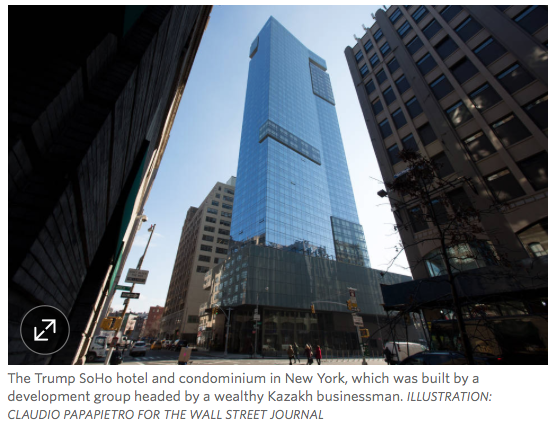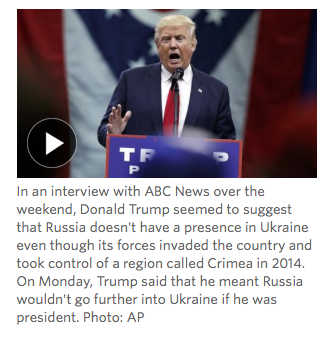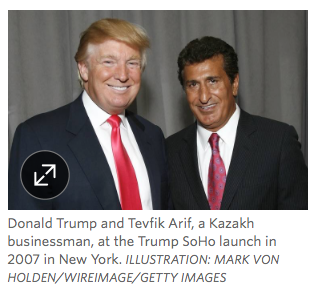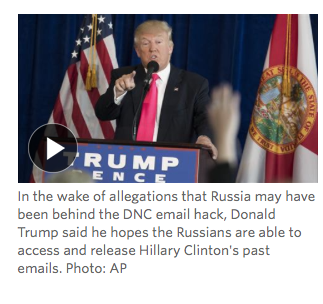 By ALEXANDRA BERZON, ALAN CULLISON and MICHAEL ROTHFELD
By ALEXANDRA BERZON, ALAN CULLISON and MICHAEL ROTHFELD
August 1, 2016 The developer tried, unsuccessfully, to build towers in Soviet states during the 1980s.
Republican presidential nominee Donald Trump repeatedly sought to gain a place for his Trump-branded towers in Russia and other former Soviet states, even in the 1980s, when the communist empire was first opening itself up to Western business investment.
While those efforts weren’t successful, the New York businessman has been able to attract investors from the former Soviet Union to Trump-branded projects outside of Russia.
Included among those are the Trump SoHo in New York, built by Bayrock, a development group headed by a wealthy Kazakh businessman, and the Trump International Hotel & Tower Toronto, which was developed by a Russian émigré.
A spokesman for the Trump campaign said the candidate didn’t have a comment on specific projects, but he said Mr. Trump hasn’t had and doesn’t currently have projects in Russia. 
Mr. Trump sparked fierce criticism last week from Democrats and members of the U.S. national security community when he invited the Russian government to find thousands of missing emails from Democratic nominee Hillary Clinton’s private server. On Thursday, Mr. Trump said he was “being sarcastic” when he made those comments.
The presidential candidate has long called to improve relations with Russian President Vladimir Putin . In an interview Sunday on ABC, Mr. Trump said the U.S. would have a “better relationship with Russia” under a Trump presidency.
Mr. Trump also told ABC that he had no investments or debts in Russia. But he has made clear over the past two decades that he was interested in doing deals there from the time the former Soviet Union began to open up.
In his book “The Art of the Deal,” published in 1987, Mr. Trump and his co-author wrote about his attempt to build a “large luxury hotel” across the street from the Kremlin in a joint-venture partnership with the Soviet government after meeting the Soviet ambassador at a luncheon. 
After receiving encouragement from the ambassador that Soviet Union tourism officials might be interested in a deal, Mr. Trump said he flew with his then-wife to Moscow and stayed in Lenin’s former suite at the National Hotel.
“I was impressed with the ambition of the Soviet officials to make a deal,” Mr. Trump wrote. The project never got off the ground.
In the 2000s, he began working with a Kazakhstan metals businessman, Tevfik Arif, who sought to help Mr. Trump build hotels in Moscow, in Kiev, in Poland and elsewhere.
The overseas projects proposed by Mr. Arif also fell through, but Mr. Trump said at the time that he expected to do more deals in Russia.
Asked in a 2007 legal deposition whether he had any concerns about doing business in Russia, Mr. Trump said he didn’t.
“I think there’s risk in doing any deal,” Mr. Trump said. “It’s ridiculous that we wouldn’t be investing in Russia. Russia is one of the hottest places in the world for investment.” 
In the same deposition, a lawyer asked Mr. Trump about a newspaper report that quoted him saying that he would be “crazy” to invest in Russia.
Mr. Trump responded that he would never have said that because he wouldn’t want to invite the displeasure of a Russian politician since he hoped to do business there in the future.
Mr. Arif built Trump SoHo, giving Mr. Trump an ownership stake in exchange for the use of his name. Mr. Arif’s firm, Bayrock, counted Alexander Mashkevich, a billionaire in the metals industry whose business is based in Kazakhstan, as a key funding backer, according to a document reviewed by The Wall Street Journal. Mr. Mashkevich, through a spokeswoman, declined to comment.
Mr. Trump has offered varying accounts of his relationship with Mr. Arif. In a 2007 deposition in a civil lawsuit, he said Mr. Arif was his primary contact at Bayrock, now defunct. In a 2011 deposition for a different lawsuit, he said he didn’t know Mr. Arif well.
In an interview with the Journal in May, Mr. Trump said he believed he came to know Bayrock through the late developer Tamir Sapir, who was an investor with Mr. Arif’s company in Trump SoHo.
Mr. Sapir, who emigrated from Georgia in the Soviet Union to New York in the 1970s, leveraged business ties in his home country to become a successful developer, according to his corporate biography. He was a booster of trade between the U.S. and the Soviet Union in the 1980s, which led him to become a foreign partner for Russia’s emerging oil industry.
In a speech in 2008, published in a trade publication, Mr. Trump’s son Donald Trump Jr. said: “Russians make up a pretty disproportionate cross-section of a lot of our assets,” including the SoHo project.
Mr. Arif couldn’t be reached for comment.
Mr. Trump’s partner in his Canadian project, Trump Toronto, is Alexander Shnaider, a Russian-born émigré who was until recently married to the daughter of Boris Birshtein, a Lithuanian-born international trader. Mr. Shnaider has said in interviews with Canadian media that his former father-in-law opened doors for him in the former Soviet Union and helped establish him in steel trading, where he made his fortune.
Mr. Shnaider’s spokesman said he had no desire to discuss Mr. Trump.
In his 2015 financial disclosure, Mr. Trump also reported that he made more than $2.5 million from an Azerbaijan deal that lent his name to a tower being developed by the son of an Azerbaijan government minister.
Write to Alexandra Berzon at alexandra.berzon@wsj.com, Alan Cullison at alan.cullison@wsj.com and Michael Rothfeld at michael.rothfeld@wsj.com
Corrections & Amplifications:
Donald Trump Jr. said in a speech in 2008, published in a trade publication: “Russians make up a pretty disproportionate cross-section of a lot of our assets.” An earlier version of this article incorrectly attributed the quote to Eric Trump. (Dec. 13, 2016)


You must be logged in to post a comment Login